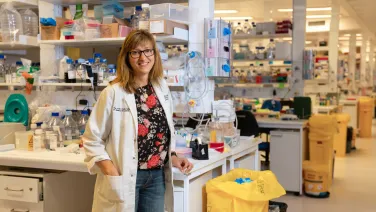The Jiang Group - Personalised Medicine and Autoimmunity
Identifying the genetic and cellular causes of immune mediated disease to personalise diagnosis and treatment.
Research themes
About

The Jiang Group utilises personalised medicine to understand the unique causes of disease in individuals and their families. Conventional management of immune disease assumes the causes of disease are similar in each individual and as a result many immune treatments are variably effective despite significant side effect profiles. Our laboratory identifies disease-causing genetic variants and investigates how these variants impair immune function leading to a diverse group of immune mediated illness including systemic lupus, rheumatoid arthritis, myositis and inflammatory bowel disease. Leveraging this understanding of an individual’s genetic, molecular and cellular cause of disease to develop personalised treatments for each individual.
The Personalised Medicine and Autoimmunity laboratory leads a national personalised medicine program for physicians and patients with immune disease. Novel insights into the causes of disease have allowed us to start development of new therapies for treatment of autoimmune disease. Further, we have adapted this approach to understand the causes of endemic kidney and immune disease in Indigenous Australian communities with the aim of improving community health outcomes and continue to develop new technologies in personalised medicine including artificial intelligence and gene editing.
We welcome enquiries from potential Honours, PhD and Postdoctoral fellows contact us to discuss research opportunities in these domains. For more information, please contact Dr Vicki Athanasopoulos or Associate Professor Simon Jiang.
Publications
Projects
Members
Leader
Manager
Senior Fellow
Researcher
Technician
Research Technician - Scientific Programs Team
Technician
Research support officer
Administrator
Administrative Assistant
Student
External members
News
Location
Building 131, The John Curtin School of Medical Research
















